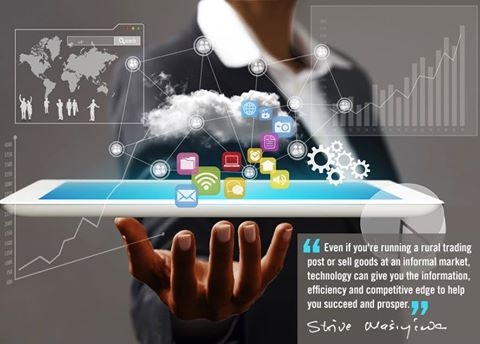
The other day I was talking to a friend who runs a fast-moving consumer goods company, or what the experts call an “FMCG” company. He was surprised when I said to him, “I also consider myself to be in the FMCG sector; I discourage my people from seeing our business as a ‘technology’ business.”
“I don’t understand what you mean?” my friend said. “I thought you were in the telecoms business; isn’t that technology?”
“We sell fast-moving consumer goods. Our products and services (things like ‘airtime’) are for the mass market consumer. We’re no different from Coca Cola. We’re chasing the same consumer dollars.”
Then I added, “Now if you’re a consumer goods company selling bread, you must begin to see yourself as technology company if you want to succeed in today’s digital world.”
A technology company that sees itself only as a “technology” company will end up losing sight of the customer. And yet almost all businesses must so embrace technology in everything they do that, for all practical purposes, they’re “technology” companies:
The most successful businesses today (big or small) are those that see themselves as “technology” companies, irrespective of what business they are in!
Confused?
Imagine an entrepreneur who’s running a small supermarket at a busy business center. Her business seems simple enough: she buys fast-moving goods like bread and meat, and sells them to her community, and perhaps to people who travel through it, like tourists or visitors.
How can we turn her business into a “technology business”? How could she use technology to make herself more efficient, attract more customers, be more profitable, and grow — perhaps into a franchise? What advice would you give her?
# She needs to have a smartphone for starters. Through her smartphone she can buy applications (Apps) readily available on the Internet to help her with things like inventory management, payroll management, record keeping and accounts.
All this is technology.
# She can use the Internet to link up with wholesalers and other suppliers to order goods and compare input prices.
# She can research the retail price her competitors are charging for the same items.
# She can bank using her cell phone. She can be part of a savings scheme.
# She can invest in a credit card terminal to attract new business and larger orders.
# She can advertise her goods on the Internet using everything from Facebook, to Instagram, etc.
# She can even set up her own website. There are so many young people who can develop a website for her at very little cost. Whatever business you’re in, even the informal sector, you must begin to have a presence on the Internet!
Technology matters in your business. Take the time to look for creative ways to leverage it to make your business more visible, efficient and profitable!
__Don’t think you must wait until you’re “big” before you learn to harness technology. You’ll become big by harnessing technology! Even if you’re running a rural trading post or sell goods at an informal market, technology can give you information, efficiency and competitive edge to help you succeed and prosper.
In this series I’ll talk about how technology can transform even the smallest business, in any sector. As the great inventor Thomas Edison said, “There’s a better way to do it – find it!”
To be continued. . .
Author: Strive Masiyiwa is the Executive Chairman & Founder of the Econet Group.









